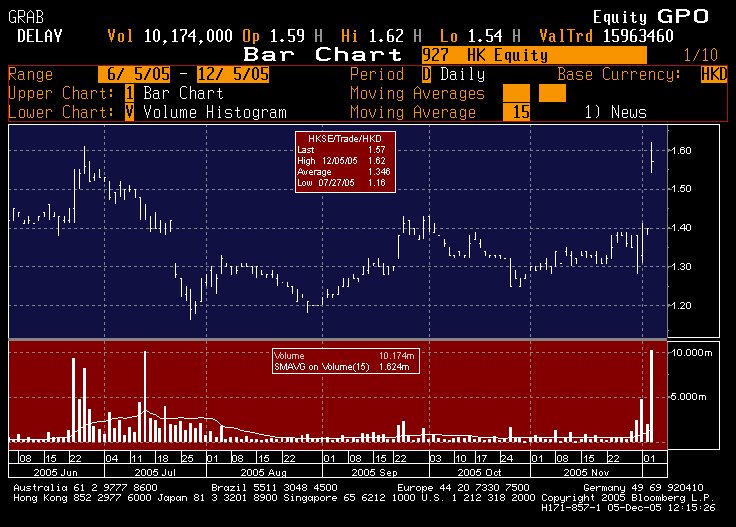|
| ||
|
December 05, 2005
You are on the invidual archive page of The David Webb effect. Click Simon World weblog for the main page.
|
|
The David Webb effect
Once a year David Webb takes a break from his corporate and political governance activities and shares with the world his Christmas stock pick. He only chooses one, and inevitably the picks have given incredible returns. This time around he has recommended Fujikon. Below the fold is the share price chart of Fujikon. On Friday it closed at $1.40, before the report, today it is trading at $1.57. That's a 12% jump, or a rise in HK$63 million in the market capitalisation in the stock. You'll also notice on the graph below a marked increase in trading volume late last week - was that Mr. Webb's purchases or could word have leaked? More importantly, for all of you students of finance, please explain to me how the efficient markets theory works again? Nothing has materially changed in this stock, except a solo operator put out an independent piece of research. He didn't discover anything new, or any non-public information.
Trackbacks:
TrackBack URL for this entry: http://blog.mu.nu/cgi/trackback.cgi/135482 Send a manual trackback ping to this post.
Comments:
There's nothing in the rise of Fujikon that is inconsistent with the Efficient Market Hypothesis. The EMF asserts that a securities price reflects all relevant publicly available information. The fact that Webb recommended the stock was added to the suddenly added to the mix of publiclay available information and the the price of Fujikon shares rose. Additional public information = different stock price. Question: Why should Webb's recomendation cause the price to increase in an efficient market? Answer: Because a large number of people reading Webb's advice don't believe in / understand the EFM and will run out to follow Webb's advice and buy the stock (or, if already holding it be less inclined to sell). This creates buyside pressure which, applying the law of supply and demand, causes the share price to rise. Nor is the pre-release rise in Fujikon inconsistent with the EFM. As Prof. showed, that insiders profit from trading on the EFM applies to public information only. Insiders are nevertheless able to profit from inside information because that information is not already incorporated into prices. Were that not the case there would have been no need to send Ivan Boesky to jail. posted by: Conrad on 12.05.05 at 01:25 PM [permalink]I had an inkling you'd take the bait, Conrad. First things last - I was more pointing out the big jump in trading volume last Thursday and Friday in this stock compared to its recent average. This is a common indicator that something is "going on". That ties in with your "insider" theory. But in this case Webb is independent of the company insiders. As I said in the post proper, it could have been Webb's own purchases. You are right that "new" information came into the market - that Webb was recommending shares in this company. But none of the company's fundamentals have changed today from Friday. Webb only compiled a report and recommendation based on already publicly available information. So Webb recycled old information - is that "new" enough for the theory? I would have thought not. posted by: Simon on 12.05.05 at 03:23 PM [permalink]Simon: But as you know, "information" is not limited to information about fundimentals. Webb's recommendation itself became relevant information. Some people will but the stock based upon Webb's recommendation. The same sort of thing happens whenever word gets out that Warren Buffet is buying a certain stock. The fact of Buffet's purchase, which has nothing to do with a change in fundimentals, is nevertheless added to the sum of available nformation, causing a price rise. Other folks will buy the stock because they know people in the first group above will will be buying based upon Webb's recommendation, thereby causing a rise. But again, Webb's recommendation is the additional relevant information that led to the price rise. The fact that 'insiders' apparently bought the stock in advance and in anticipation of Webb's recommendation is evidence of this effect. Don't get me wrong, I'm not a big believer in the EFM. I've made way too much money selling fad stocks short to believe that prices reflect all relevant informaion according to its proper weight. The internet bubble and the SARS outbreak are tow recent examples that demonstrate known information can be overweighted or overdiscounted by the markets. I completely share your appreciation of the irony that HK's corporate governance guru has apparently caused a bout of insider trading. posted by: Conrad on 12.05.05 at 04:39 PM [permalink] |
|
